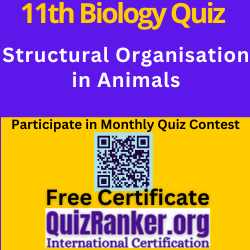Improve your understanding with our Structural Organisation in Animals MCQ Test for 11th Biology Chapter 7. This MCQ Test covers animal tissues, organ systems, and body plans to help you learn about animal structure and organization.
Attempt Structural Organisation in Animals MCQ Test
Attempt Chapter wise 11th biology MCQ Test and Monthly Quiz contest of Biology 11th grade.
Brief Summary for Structural Organisation in Animals MCQ Test
Cells, tissues, organs, and organ systems divide the work in a body, ensuring its survival and showing division of labor. A tissue is a group of cells with intercellular substances that perform specific functions.
- Epithelia: Sheet-like tissues that line the body’s surfaces, cavities, ducts, and tubes. They have one free surface facing a body fluid or the outside environment and are connected by junctions.
- Indian Bullfrog (Rana tigrina): Common in India, covered by skin with mucous glands that aid respiration both in water and on land. The body is divided into head and trunk, with a muscular, bilobed tongue used to capture prey. The alimentary canal includes the esophagus, stomach, intestine, and rectum, ending in the cloaca. Digestive glands are the liver and pancreas. Respiration occurs through the skin in water and lungs on land. The circulatory system is closed with single circulation and nucleated RBCs. The nervous system consists of central, peripheral, and autonomic systems. Kidneys and urinogenital ducts open into the cloaca. Males have testes, and females have ovaries, laying 2500-3000 eggs at a time. Fertilization and development are external, with eggs hatching into tadpoles that metamorphose into frogs.
Chapter wise biology 11th grade mcq
Chapter 1 The Living World MCQ Test
Chapter 2 Biological Classification MCQ Test
Chapter 3 Plant Kingdom MCQ Test
Chapter 4 Animal Kingdom MCQ Test
Chapter 5 Morphology of Flowering Plants MCQ Test
Chapter 6 Anatomy of Flowering Plants MCQ Test
Chapter 7 Structural Organisation in Animals MCQ Quiz
Chapter 8 Cell The Unit of Life MCQ Test
Chapter 9 Biomolecules MCQ Test
Chapter 10 Cell Cycle and Cell Division MCQ Test
Chapter 11 Photosynthesis in Higher Plants MCQ Test
Chapter 12 Respiration in Plants MCQ Test
Chapter 13 Plant Growth and Development MCQ Test
Chapter 14 Breathing and Exchange of Gases MCQ Test
Chapter 15 Body Fluids and Circulation MCQ Test
Chapter 16 Excretory Products and their Elimination MCQ Test
Chapter 17 Locomotion and Movement MCQ Test
Chapter 18 Neural Control and Coordination MCQ Test
Chapter 19 Chemical Coordination and Integration MCQ Test
Source for Study
Total Views: 8


